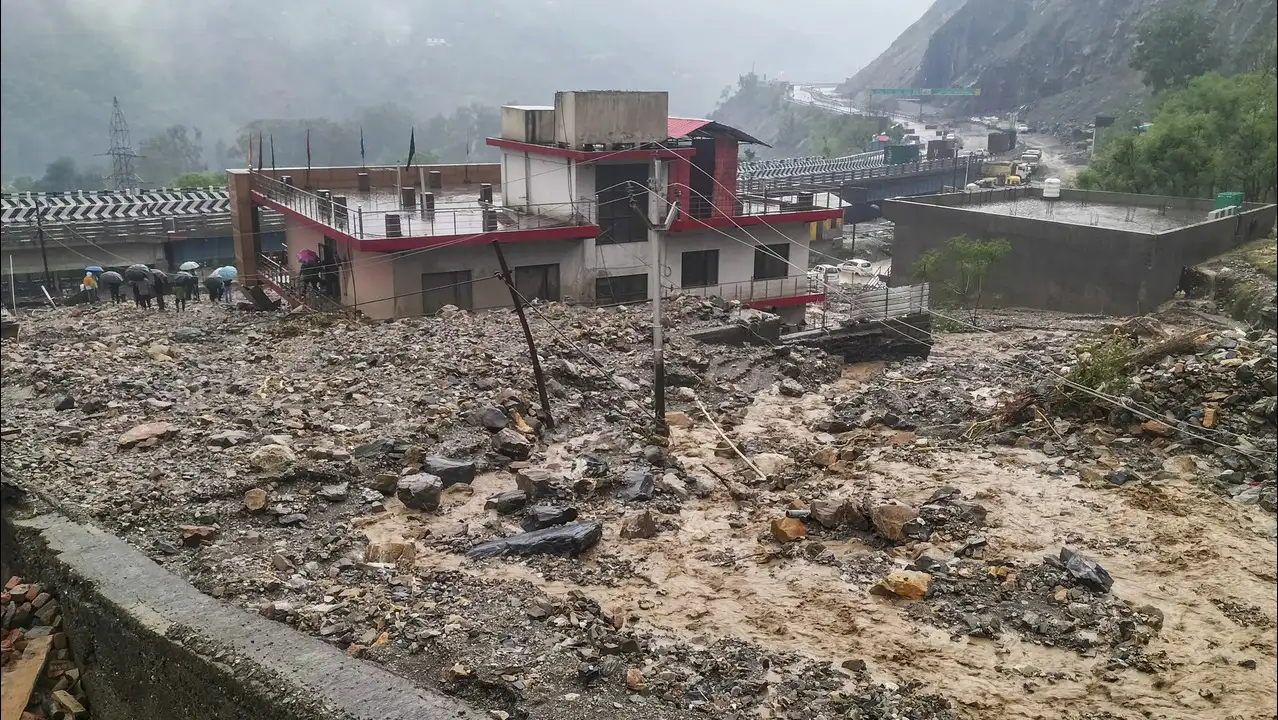The Jammu-Srinagar National Highway (NH-44), a critical arterial route connecting the Kashmir Valley to the rest of India, was completely shut down over the weekend following heavy rainfall that triggered multiple landslides in Jammu and Kashmir’s Ramban district.
The disruption has left hundreds of commuters stranded, property damaged, and residents vulnerable as extreme weather events continue to batter the Himalayan region. According to transport authorities, the highway remains fully blocked in several stretches, particularly near the Ramban sector, where soil instability and rockfalls have rendered sections of the road unsafe. Officials have urged commuters to avoid attempting travel on this route until weather conditions improve and road clearance operations are successfully completed.
The district administration has confirmed that continuous rain has hampered the pace of the debris clearance work, raising the possibility that the highway could remain shut until late Monday or even longer. Civil teams and traffic personnel remain on standby, but persistent rainfall and muddy terrain are limiting access to affected sections. The situation reflects a worrying pattern of increasingly frequent weather disruptions in the region, which many experts attribute to broader climate shifts. Residential areas have not been spared either. In several parts of Ramban district, homes have been partially or completely damaged as landslides tore through fragile hillside settlements. Vehicles parked in lower elevations have also borne the brunt of the debris. Emergency teams are assisting affected families while ensuring that evacuation and temporary shelter arrangements are in place where required.
Meanwhile, the impact of the inclement weather is not confined to Ramban alone. In the high-altitude area of Sonmarg, snow clearance operations are currently underway along the Amarnath Yatra trail in Baltal, spearheaded by the Border Roads Organisation. In Doda district, persistent downpours have blanketed villages in thick fog, limiting visibility and access. Udhampur district, another key zone along NH-44, also reported blockages due to rain-induced slides. In Namban, the highway has been obstructed by fallen trees and soil deposits, cutting off parts of the region from essential supplies and services. Similar scenes were reported earlier this week when strong winds uprooted trees and downed electricity lines, leaving sections of the district in darkness and causing widespread infrastructure damage.
Weather authorities had earlier warned of such developments. The India Meteorological Department (IMD) issued an alert on Saturday predicting severe conditions between April 18 and 20 due to the passage of an active western disturbance. The forecast, which included heavy rain, hailstorms, and gusty winds, prompted state and district agencies to implement emergency protocols. These include livestock relocation, suspension of non-essential travel, and monitoring of landslide-prone zones. In Rajouri district’s Kalakote sub-division, the situation is particularly grim. A violent windstorm accompanied by hail ravaged the region on April 19, leaving hundreds of homes without roofs and damaging school infrastructure. According to administrative officials, tin-sheet structures across Tehsil Kalakote and Mogla Block were among the most affected. Nearly 100 households have reported significant structural losses, adding to the growing humanitarian burden triggered by the extreme weather.
Local officials are assessing the damage to chart out relief disbursement. “We are prioritising areas where housing vulnerability is highest and ensuring temporary accommodations are arranged for families rendered homeless,” said one senior district officer. Schools in impacted areas are likely to remain shut until repairs are undertaken and basic safety standards are met. Climate researchers point out that while such weather patterns are not entirely new, the frequency and intensity have seen a marked increase in the last decade. The fragile Himalayan terrain is particularly susceptible to shifts caused by unseasonal rain and warming trends. Experts have long cautioned that inadequate urban planning, deforestation, and poor slope management in mountainous states like Jammu and Kashmir make the region highly prone to natural calamities.
The disruption of NH-44 has once again underlined the need for resilient infrastructure planning that integrates climate adaptation. As the only all-weather road connecting the Kashmir Valley with the rest of India, its vulnerability directly impacts trade, tourism, healthcare access, and supply chain operations. Policy planners are increasingly advocating for diversified transit routes, underground tunnel systems, and green slope stabilisation technologies to safeguard mountain connectivity from climate-induced threats. However, implementation remains slow due to funding constraints and difficult terrain.
Until the weather stabilises and roads are cleared, commuters are being asked to delay travel plans, and residents near slope regions are advised to remain vigilant. Relief teams are working round the clock, but the situation remains dynamic and weather-dependent. As the Union Territory braces for more unpredictable climate events, the larger question looms: how can a balance be struck between infrastructural progress and ecological prudence? With weather extremes becoming the new normal, the Jammu-Srinagar highway crisis is a stark reminder of the urgent need for climate-resilient planning in India’s most sensitive geographies.
ALso Read : https://urbanacres.in/islamabad-breaks-ground-on-srinagar-highway-link/


